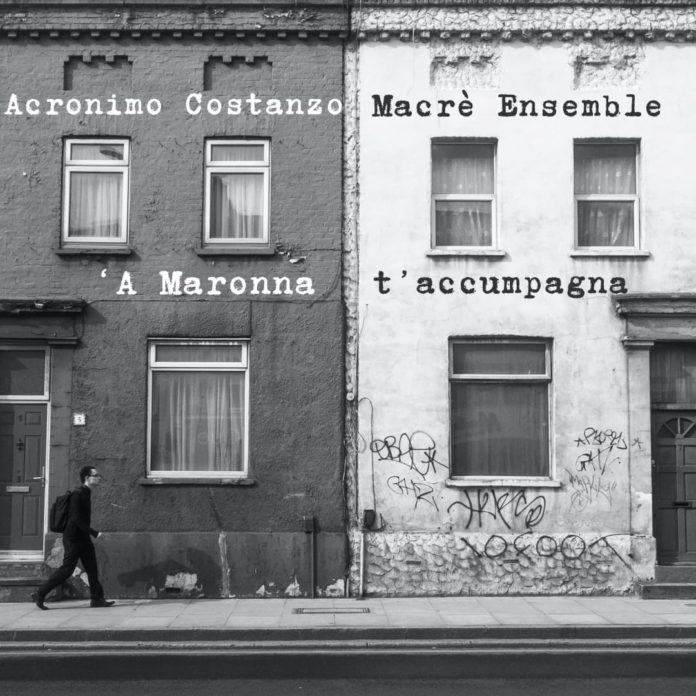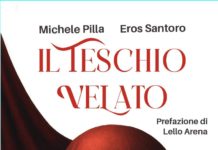‘A Maronna t’accumpagna Tra Dostoevskij e Napoli, un canto di pace e d’amore per i popoli è il nuovo singolo di Acronimo Costanzo & Macrè Ensemble su etichetta ed edizioni Suono Libero Music, disponibile in distribuzione digitale e nelle radio. Il brano, che dà seguito al precedente Passame ‘e parole, vede il cantautore napoletano ancora una volta accompagnato dal polistrumentista Diego Ruschena, autore anche degli arrangiamenti, e dal sassofonista Renzo Cristiano Telloli, con i suoi preziosi insert di sax che dialogano con la melodia del canto.
A Maronna t’accumpagna, una frase settecentesca che significa, letteralmente, “Che tu possa camminare protetto dalla luce della Madonna”, è il commiato che i nonni di Antonio “Acronimo” Costanzo gli rivolgevano, ogni qualvolta si accingeva a uscire di casa, e che ha ispirato il brano.
«A quel tempo vedevo le strade come un luogo sicuro, gioioso, in cui fare amicizia e giocare per ore con un pallone senza preoccupazione alcuna – racconta l’autore. Nel videoclip ho voluto raccontare proprio quanta bellezza ancora oggi possa trovarsi in strada, in contrapposizione alla drammaticità degli ultimi tragici avvenimenti di cronaca. Mi riferisco in particolar modo all’uccisione del giovane musicista Giogiò, e alle violenze subite dalle due bambine a Caivano, a pochi passi da dove ho vissuto da ragazzino (Frattaminore) prima di trasferirmi a Lucca. Perdere la vita, vivere la sofferenza, tra le strade o i quartieri della propria città è intollerabile. Si l’ammore è ‘o vero, camp’ cchiù ‘e na sera, canto nel brano, proprio per sottolineare che se siamo mossi da amore e rispetto verso il prossimo la nostra vita non finirà improvvisamente in una sera».
Affinché ‘a Maronna ci accompagni tutti e ci faccia ritornare sicuri a casa, occorre, parafrasando Dostoevskij, che L’educazione salvi il mondo. L’auspicio è che l’umanità sia mossa da profondo altruismo, e si torni a colorare le strade di gioia, come se celebrassimo quotidianamente uno scudetto.
Acronimo Costanzo, è maestro di scuola primaria a Prato ma con Napoli ha un legame viscerale. La scelta di cantare nella lingua di Partenope, dopo tanti album in italiano, lo testimonia fortemente: «In questo progetto voglio ritornare ai suoni della mia terra che ha dato i natali a straordinari Artisti come Eduardo De Filippo, Pino Daniele, Renato Carosone, che hanno saputo innovare e arricchirci».
L’artista ha da poco pubblicato con Angela Onorato il libro “Strambe storie alla luna” (ed. Porto Seguro) e sta attualmente lavorando per il progetto discografico, il primo totalmente in napoletano della sua produzione in quattro album, e sarà pubblicato entro il 2024.
VAI AL VIDEO:
https://www.youtube.com/watch?v=xytrD685uMU&t=5s
Per saperne di più
3512167918 info@suonoliberomusic.com
www.suonoliberomusic.com
Suono Libero Music/ ‘A Maronna t’accumpagna: Acronym Costanzo’s latest single is a song of peace
‘A Maronna t’accumpagna. Between Dostoevsky and Naples, a song of peace and love for peoples: this is the new single by Acronimo Costanzo & Macrè Ensemble on the Suono Libero Music label and editions, available in digital distribution and on the radio.
The track, which follows up on the previous Passame ‘e parole, sees the Neapolitan singer-songwriter once again accompanied by multi-instrumentalist Diego Ruschena, also author of the arrangements, and saxophonist Renzo Cristiano Telloli, with his precious sax insertions that dialogue with the melody of the song.
A Maronna t’accumpagna, an eighteenth-century phrase that means, literally, “May you walk protected by the light of the Madonna,” is the farewell that Antonio “Acronym” Costanzo’s grandparents addressed to him whenever he was about to leave home, and which inspired the song.
“At that time I saw the streets as a safe, joyful place to make friends and play for hours with a ball without any worries- the author says- In the video clip I wanted to tell precisely how much beauty can still be found in the streets today, as opposed to the drama of the latest tragic news events. I am referring in particular to the killing of the young musician Giogiò, and to the violence suffered by the two little girls in Caivano, just a few steps from where I lived as a young boy (Frattaminore) before moving to Lucca. To lose one’s life, to experience suffering, in the streets or neighborhoods of one’s city is intolerable. Si l’ammore è ‘o vero, camp’ cchiù ‘e na sera, I sing in the song, precisely to emphasize that if we are moved by love and respect for others our lives will not suddenly end in an evening.”
So that ‘a Maronna may accompany us all and return us safely home, it is necessary, paraphrasing Dostoevsky, that Education saves the world. The hope is that humanity will be moved by deep altruism, and we will return to coloring the streets with joy, as if we were celebrating a Scudetto on a daily basis.
Acronym Costanzo, is an elementary school teacher in Prato but has a visceral connection with Naples. The choice to sing in the language of Partenope, after so many albums in Italian, strongly testifies to this: “In this project I want to return to the sounds of my land that gave birth to extraordinary artists such as Eduardo De Filippo, Pino Daniele, Renato Carosone, who were able to innovate and enrich us”.
The artist has recently published with Angela Onorato the book “Strambe storie alla luna” (ed. Porto Seguro) and is currently working on the recording project, the first totally in Neapolitan in his four-album production, and will be released by 2024.










